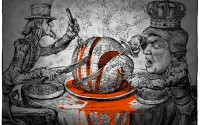By Yifat Susskind
3 December 2008
www.zmag.org/znet/viewArticle/19829
Right now, while the horror of the attacks in Mumbai is reverberating around the world and tensions between India and Pakistan are mounting, there is a crucial move that President-elect Obama could make to chart a positive course forward. Obama should renounce the "war on terror."
Think about it: since the weird semantic banner was first unfurled, the number and ferocity of terrorist attacks has only increased . Mumbai is just the latest battle-front. And in the seven years since George Bush put the world on notice with his "you're either with us or with the terrorists" declaration, the US has actually managed to fuel support for groups that use terrorism. That's because the "war on terror" has led millions of people to conclude that the US is an even greater threat to their safety and freedom than Al Qaeda and other violent fringe groups.
And who can blame them? After all, George Bush and Dick Cheney literally declared the whole world to be their battlefield—and forever. Under the banner of the "war on terror," the US has overthrown a sovereign, if nasty, government (Iraq), trampled the UN Charter (the 2003 invasion), tortured prisoners ("enhanced interrogation techniques" to quote the Bush Administration and the Nazis), openly armed and funded death squads (the "Salvador Option"), and lowered the bar on governments' accountability to human rights standards and civil liberties worldwide.
Now, the Indian government is poised to go down the same road. Leaders of India's main opposition party, the Hindu-nationalist BJP, are demanding that their government act like the US did after 9-11. They see no reason that India shouldn't avail itself of the same strong-arm tactics that the Bush Administration has enjoyed—and legitimized.
Here's the reason: terrorist attacks are not acts of war to be responded to in kind, but crimes against humanity. As crimes, they should be investigated and the perpetrators tried and prosecuted. We have the body of international laws and institutions needed to pursue genuine justice in the wake of terrorist attacks. Let's use them. And let's dust off the tradition of peaceful cooperation between governments (we're going to need it anyway, to deal with the global recession and climate change).
The lessons of the past seven years are that there is no military solution to terrorism; that a militarized response only feeds the same constellation of forces that produce support for terrorism; that a war on terror enhances the power of extremists on both sides and shuts down the space for dialogue, diplomacy and decency.
That's the message we need to deliver loud and clear to President-elect Obama and his new foreign policy team. We may not be able to undo all of the damage inflicted by the Bush Administration, but we can demand a new direction, starting with a forceful human-rights based response to the atrocities in Mumbai.
Many people in India and Pakistan are calling for just such a response from their governments. Those of us in the US should demand no less of the incoming administration. The best thing President-elect Obama could do to chart a new and improved US foreign policy is to renounce the "war on terror."






